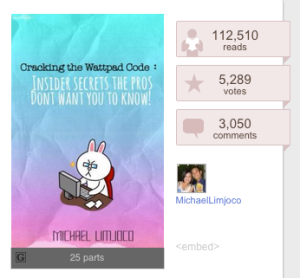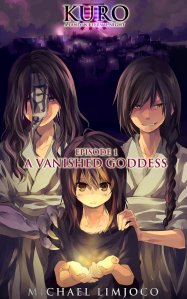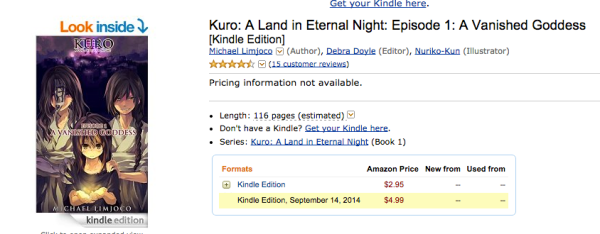 A while ago, I had the privilege of interviewing Michael Limjoco from Chicago, a fellow featured Wattpad writer, about our common interests in books, Japanese culture and anime, and his insight into the Wattpad community, especially from a marketing viewpoint. He has accumulated over a million views on his fantasy work, and wrote an extensive guide to etiquette, algorithm and strategy on Wattpad for Wattpad writers – which I have also benefited from. He is a very passionate and friendly individual and his community presence has been a blessing to the community on Wattpad.
A while ago, I had the privilege of interviewing Michael Limjoco from Chicago, a fellow featured Wattpad writer, about our common interests in books, Japanese culture and anime, and his insight into the Wattpad community, especially from a marketing viewpoint. He has accumulated over a million views on his fantasy work, and wrote an extensive guide to etiquette, algorithm and strategy on Wattpad for Wattpad writers – which I have also benefited from. He is a very passionate and friendly individual and his community presence has been a blessing to the community on Wattpad.
Takatsu: It’s wonderful to be able to “speak” to you! Can you introduce yourself, your work and your experience on Wattpad briefly?
Mike: I’m Mike Limjoco, an amateur and self published author who enjoys writing books in my spare time. I discovered Wattpad in March of 2013 and have been on it non-stop since then! I am fortunate in that I’ve gotten some good results early on. I’ve gotten to the first page of the Hot List in five genres, including a dual #1 in Science Fiction and Fantasy, a #2 in Mystery Thriller, and a #2 in Paranormal. I also have a story that’s been featured on the front page of Wattpad, and the same story was a finalist in the 2013 Watty Awards.
By day, I am Vice President of E-Marketing for a Financial Services Company that owns a group of banks. The Marketing background, especially on the Digital and Social side, have proven to be a big help in getting noticed on Wattpad because a lot of the same Marketing principles apply with respect to getting noticed on Wattpad!
T: What got you into Japanese culture and entertainment – particularly anime in the first place?
M: I got into Anime when I was younger, but I didn’t know it as Anime at the time. More or less just cartoons. Then in college was when I really discovered Animes like Ranma 1/2, Cowboy Bebop and the like. I don’t watch it as often now, but I’ll occasionally watch a Miyazaki film with my wife who loves anything from Studio Ghibli.
On interesting thing to note, is that everyone makes the connection that Kuro is Anime inspired, but it wasn’t originally developed that way. When I first wrote it, it was really just a SciFi/Fantasy novel. Then Kuro’s editor suggested that it will connect with fans of Anime. I thought, hey, why not? And then I read about cell phone novels and decided. That’s it! I’ll serialize it on Wattpad and keep shorter chapters like a cell phone novel!
T: Are there any themes or philosophies in anime stories or culture that you connect to? How is Japanese culture and anime unique?
M: I connect most often to the themes that are rooted myth or history. I like that many Japanese Anime are connected to the deities of ancient Japan. Naruto often mentions them: Amaterasu, Tsukuyomi, etc, and they come up frequently in other anime and video games like Okami. But people often link them to the Anime, and fail to look into the rich mythology and legends that spawned them in the first place.
There is an older Anime called Rurouni Kenshin that is inspired by the Tokugawa era and the subsequent Meiji restoration. It’s a fun anime to watch, but what also impresses me is how well integrated it is to events that occur during that period, and how accurately the Miburo (Shinsen-gumi) are portrayed.
T: Kenshin is fantastic – especially the live action adaptations, they really pulled that one off extremely well. Personally, I enjoy the flip side of Japanese aesthetic, culture and philosophy, such as the persevering Japanese spirit, the cherishing of the transience of life “mono no aware”, comradery and friendship, the stereotypes and the different views on gender roles, the extreme pressures of family and societal expectations and so on. And ramen.
M: Yes, I believe that Kenshin captures “Yamato Damashii” very well. As you’ve alluded the live action and the OVAs are incredible. The OVA’s have a very zen-like approach, alternating between very quiet scenes of everyday life and the incredible brutality of the fight scenes.
With respect to gender roles, stereotypes and societal expectations, I believe these are the things that hold back acceptance in the West, which looks upon these things, and, without a proper frame of reference, will consider these things “backward” or perhaps demeaning to women.
Western stereotypes of Asian culture also play into this. In the west, we think of the strict Asian father who forces his children to do what he wants, or the arranged marriage, or the subservient wife. And these stereotypes play against the Japanese cultural archetypes because although the stereotype and the cultural difference has nothing to do with each other, that is how it gets perceived through the eyes of a Westerner!
It is the same as the Asian perception of the loud American jock!
T: Yes, I do wish the Western viewpoint can come to understand the context and the rich intricate cultural layers behind each aspect of Japanese entertainment – granted, it is exaggerated and distorted, and are stereotypes of their own kind for sure. But while I retain criticism of some issues in Japanese society, they do actually give women and female characters a lot of power. In history, some of the women were powerhouses of their own kind of feminism, despite the rules or etiquette Japanese people are subject to. A lot of literature and art exalts the feminine and women often are portrayed to have tremendous influence and control over men, playing down the male intellectual ability and dominance, showcasing a range of personalities and gender spectrum, albeit mostly tactful, intended to seem subtle and manipulative, whether it is through appeal or wit. Even through older or modern literature or art, the Tale of Genji is written by a woman, the short story, Aguri, by Tanizaki, Kurosawa’s Rashomon, manipulative well-educated geisha characters, female catalysts against empty male characters in Murakami’s works (and perhaps consequentially in my novel), and onwards.
M: I agree completely! I try and do that in much of my own writing. None of my female characters are the “weak”, “subservient” types, they are all strong-willed. There are several ways in which women are portrayed as powerful in Japanese culture. It’s the silly things like harems and maid cafes that tend to confuse the western consumer’s perception of Japanese culture! It’s meant to be funny, but it may be perceived as fact.
T: Harems are pretty skewed but I guess the redeeming factor is that it also gives the female characters much influence over the male.
What are your thoughts on the popularity and potential of Japanese anime (or other entertainment) in the Western world? How marketable is it and what are the trends showing?
M: I think that Anime culture in general has tremendous potential. One only need look at the enormous success of television shows like Naruto, Bleach, and Dragon Ball in the US; not to mention US derivatives like Avatar, the Last Air Bender and it’s many spinoffs. Anime has certainly evolved beyond its Japanese roots, and though part of it will always be distinctly Japanese, it’s very interesting to see what other cultures will do with this as well.
Many people won’t remember the glory days of 80’s cartoons and the extremely high quality of the artwork and the animation back then, but a big part of that was the fact that the US outsourced a lot of it to Japan. So the cartoons we loved from the 80’s (I don’t think you’re old enough to remember, LOL!) like Thundercats, Silver Hawks, Jayce and the Wheeled Warriors many of which had better animation and art than today’s US cartoons, a lot of it was done by Japanese Studios. So it was essentially, “Anime” as well.
T: I actually do know about Thundercats, but you’re right I don’t know the rest – but do continue!
M: There seems to be a strong preference for Japanese themed games, movies and shows that originate from Japan, but not so much when they originate from other countries. Fans of anime do seem to shy away from Anime work not produced from Japan.
I’m currently in the process of taking my book Kuro and dividing it into 3 “episodes”, which is very similar to a Japanese Light Novel. When I first tried marketing Kuro, especially among the Anime influencers, i.e. bloggers and vloggers, I was very surprised to learn that they weren’t very interested in an American version of the Light Novel. It was almost as though, if I had just introduced myself as an English speaking Japanese writer, I would have gotten much more interest. It was definitely not something I was expecting, but I know better now, and tend to pursue other avenues than the traditional anime-loving audience.
Light novels, which are wildly successful in Japan have not found much success in the West. Many blame this on the localization and the subtle cultural differences in how those novels are written. For instance, you’ve talked about gender roles, and that distinction shows up all over these types of novels, which can be off-putting to a Western audience who doesn’t understand them.
I am hoping that more and more success stories show up. If you’ll look at Amazon, you’ll see several “Anime” novels that are making their way. I haven’t yet seen a runaway success, perhaps yours will be the next great case study. 😉
T: Well, I wish us both much success. It’s very true. But it does seem like the trend is progressively blurring of borders indeed – for example even with the influx of aspiring manga or anime artists on DeviantArt with a massive following and momentum, who used to only create fanart, breaking through into the original productions scene.
Back to the Wattpad community, how is the anime or Japanese culture there? What are the demographics like? What do you foresee happening within the Wattpad community regarding the anime spectrum?
M: As many are aware, Wattpad’s demographic skews young. But what is of more interest to the topic is that there is a significant Anime following here on Wattpad. Very few writers have managed to make it big beyond fan-fictions though, which brings up the same point I had before where if a work doesn’t originate from a major Anime studio or a famous manga artist, there is far less interest in it.
However, the success that Kuro has had on Wattpad, along with a few other “Anime-based” novels, NickUskoski’s Sigma Star comes to mind, leads me to believe that the desire is there, but that the authors of such anime-themed novels really need to be creative with how they’re marketing their novels to the audience. While authors of fan-fiction won’t have to struggle to find an audience on Wattpad, writers of original anime fiction will not only have to convince readers there is something worthwhile reading, but that the same writers also have the great challenge of holding the readers’ attention throughout! Which, as you very well know, is no small feat!
T: You’ve written a very effective and extensive guide to how to market yourself on Wattpad, its etiquette and studies into the algorithm. While knowing it all works in conjunction, if you had to, how would you rank the importance of:
 – Effective Book Cover
– Effective Book Cover
– Effective Book Title
– Effective Book Blurb, Tags and Genre Categories
– Publicity (proper social etiquette, commenting, getting seen and having presence, etc.)
As in, is there any specific element that pulls more weight than the others in the Wattpad system and how do readers “shop” for books to read? What if we assume Publicity aspects is already taken care of very well, how would the other parts rank?
M: I would put it in this order:
Cover, Title, Story Description, Quality of the Story, Understanding of the Audience
Beyond this, believe it or not, many of the things that people would traditionally consider part of a successful book, remarkably, DO NOT APPLY on Wattpad: For instance, literary prose, does not affect the success of a book on Wattpad. Nor does originality. In fact, many books that make it to the first page are remarkably unoriginal.
Is this bad thing? I do not believe so. Rather, it is reflective of the desire of the market as a whole for more of the same things. Movies follow the same themes. When Game of Thrones, Twilight, Harry Potter, The Hunger Games, Lord of the Rings, Transformers, and Spiderman came out, the market was soon flooded with Wannabes. In my opinion, this reflects the real world pretty closely.
The big difference in Wattpad, as with any other Social Media channel, is that the gatekeepers have been removed. In other words, no “expert” gets to chime in on a successful book. It is purely the people’s choice, not some “agent’s” choice or a publisher’s choice.
Outside of what I’ve mentioned, marketing a book on Wattpad is remarkably easy. It’s all about getting the biggest number of people to “take a look”. Comment like crazy on a number of books that are related to your own. Participate a ton in forums, start a club that is related to your topic. The goal is simple. Maximize the number of eyeballs to your book. The more eyes look at your book, the better chances it will have of getting noticed. Of course, once a reader has clicked on your book, it is up to you to deliver. Surprisingly, this is another area where a lot of people fail!
The idea is simple – if you have a good product, people will notice eventually. The key is to get as many as you can to take a look, and then deliver when they do. The ranking algorithm, and word of mouth, will do the rest!
T: For me, that doesn’t sound like good news, since I’m into literary prose! But perhaps as you said, my cover and title might have been pulling in some of the weight for those eyeballs. I am always wondering about how much each element affects the success.
Along the topic and the importance of covers and anime-culture, I love Kuro’s cover and you probably had strong reasons for getting it done and so on. Who was the artist? Is there anything you can share about the process?
M: During Kuro’s editing phase, my editor, Dr. Debra Doyle (who is a SciFi author with 30 published novels to her name), suggested a number of avenues to purse. She thought that the Firefly crowd/Joss Whedon fans would enjoy it, and of course she thought the Anime crowd would. So I said, ok, let’s go all in and promote this as an Anime novel!
I went to DeviantArt and began to search for artists whose art would match the novel’s style. One of the people who came up on my radar really early on was Nuriko-kun, a manga artist from Canada. She was already famous on Deviant Art for her “Parashi” anime series that she self-publishes as a series of art books. I was fortunate that she was available for commissions.
Nuri was really wonderful to work with. Not only did she take the time to read a few of Kuro’s chapters to get a feel for the characters, but she really paid attention to my input to make sure that each of the characters she drew matched the characters in the novels. She did several illustrations for me.
The cover that appears in Kuro episode 1 is the one with three of my most important characters: the main character Mina in the middle, and the sisters Vannah and Searra von Talthys behind her. Of the three characters, Vannah is easily the most complex: she’s a six-hundred year old Dark Priestess who looks like a sixteen year old! Six hundred years ago, she bound a demon lord to her sister to save the world. That she might watch over the demon through the ages, she made the ultimate sacrifice, partaking of the demon’s cursed blood, damning herself for eternity. So both priestess and demon are bound to each other forever. Nuri did in an excellent job capturing Vannah’s air of mystery. Her crooked, half smile with the sharp teeth (that betrays her demon blood) is pretty much what I had envisioned all along. I love what she did! The rest of Nuri’s illustrations I use in the remaining 2 episodes.
The illustration process was simple, Nuri would read a chapter, get my descriptions of the character, ask any questions she might have, and then present me with a rough sketch, which we would then tweak until I was satisfied. At that point, she would color it in. Nuri is a master of color and shading, so I don’t really have too many changes past this stage other than getting the colors right for each character – the way she paints and shades her illustrations is incredible!
I attribute 80% of Kuro’s success to the cover, no joke! It’s what gets people’s attention every time, so it was well worth the time, money and effort we put into developing it. In a world where many self-published books have anime-themed covers, Kuro’s cover really stands out.
T: She is an absolutely brilliant artist. The cover is no doubt effective for the anime crowd.
How reflective is the Wattpad algorithms and marketing culture compared to the real publishing industry?
M: This is very interesting question! Mostly because it reveals inherent differences in business models. The publishing industry has always been categorized as “wait and hurry up” and the self publishing industry has been categorized as “hurry up and wait”. Traditional publishing relies on a writer to hone their craft through years and years of toil to make sure they get “everything right” and get past the gatekeepers. There’s nothing wrong with this model and it’s worked for the longest time.
However, the new model shows that it is also, equally possible to buck the trend, get past the gatekeepers and do your own thing. In other words, get your book out there, and then wait and do the effort of marketing it.
When it comes to the latter, Wattpad is eerily and remarkably similar to Amazon’s model. Amazon, like Wattpad, relies on an algorithm to rank books in a particular category. Those who understand how the algorithm works, is in a remarkable position to capitalize on that. It is a dramatically different model from what the publishing industry has, which relies on having a quality book/marketable story, versus, the actual marketing itself. It is VERY possible to be successful on Amazon and self publishing by being a shrewd marketer first, and a writer second.
T: You’ve recently published Kuro as episodes on Amazon. How has that process and experience been so far? How are your readers responding? Do you know if there are new audiences you’ve tapped into by reaching into the “published” market?
M: Thanks for noticing and asking Taka! It’s too early to tell right now, but I do have some feedback that may be of interest: I held two free promotions recently (Amazon’s KDP Select allows you five free promo days every three months to use as you see fit). The first promo I had was Wattpad-only. In other words, I didn’t promote Kuro outside of Wattpad. The second promo, I used other channels. What I found was that the second promo was a lot more successful than the WP-only one, and that WP contributed very little to the second promo as well.
Again, this leads me to believe that the paying audience is dramatically different from the WP audience – this is a whole new audience! However, my initial success on WP let me put a lot of terrific marketing copy on the book itself (I listed Kuro’s WP accomplishments, and my readers gave me wonderful reviews), which I believe made a significant difference in how the book is perceived on Amazon. In other words, Kuro’s success on WP gave it significant social-proof, which is very important for sales on Amazon.
T: What do you think are the highest saturated markets and what niche markets haven’t been tapped into and might be worth a look from the marketing angle? (i.e. genre, target audiences etc)
M: I think that Wattpad is very remarkably approaching Amazon in similarity. You have genres and categories that are becoming very saturated. And saturation makes it very difficult for the unknown writer to succeed. Therefore it has become increasingly important that writers understand how to appropriately target the audience that they are looking to capture. Appropriately categorizing your book on Wattpad has now become very important when it was less so in the past. Romance, Teen Fiction, Sci-Fi, and Fantasy have become very difficult genres to crack. You need dramatic results to move the needle in the those categories. Sometimes by several orders of magnitude! I suspect we will start seeing sub-categories on Wattpad soon, something that is very similar to the Amazon category.
One of the things I have been anticipating from Wattpad for a while now is a monetization model. This will separate the amateurs from the pros, and will bring a massive influx of competition. Most writers won’t be able to cut it when that happens, but I am very much looking forward to the competition and the change of landscape that will bring! I may not survive it either, but I am nonetheless excited to see it happen!
For now, my advice is this: understand the type of reader that will be into your novel, and target them obssessively! If you have a Vampire book, you NEED to understand where those readers hang out, and what books they read. You’ll need to get in front of those readers as often as you possibly can! When I first launched Kuro, I was pretty clear who the potential readers would be. And so I went ahead and started one of the early Anime Clubs on Wattpad! Again, finding creative ways to find your audience will always be rewarded on Wattpad!
T: Coincidentally, I did start up a Literary Fiction network on Wattpad in the past few months! It definitely has been great to connect with similarly interested readers and writers.
How do you think Wattpad will change in terms of demographics or trends in the next year?
M: I’ve long believed that Wattpad’s greatest strength and accomplishment was that it was able to tap into an audience that published novels didn’t have access to: the reader base of what I will call “non-paying” readers who enjoy “non-literary” works purely for entertainment purposes.
There are three cases that come to mind right now (there are many more such cases, but these come to mind immediately):
– Readers of fan-fiction
– Readers in underdeveloped countries for whom purchasing a book is still very much a luxury
– Young readers who may not have even picked up a physical book, but who have nonetheless discovered the joy of reader through their mobile devices.
I believe that as Wattpad continues to grow its audience beyond “free readers”, a few interesting things will happen:
1) The universe of paying readers will begin to notice Wattpad and take it seriously. This is already beginning to happen more and more as published authors take their works to Wattpad, and as Wattpad ups the quality requirements for their Featured Stories.
2) The universe of non-paying readers will begin to evolve into paying readers as Wattpad and Amazon make books more accessible to those in underdeveloped countries with unique pricing models, and as younger readers grow up and begin to make money on their own.
Once the two universes of readers converge, I believe we will begin to notice a dramatic shift in demographics and trends on Wattpad. As readers grow to appreciate fine literature, brought about by the increased competition from published authors and featured authors combined with the universe of paying readers who expect the prose to be there, tastes will change and we will see more and more high quality works of fiction showing up on the Hot List.
In truth, it has always been story over prose, and that hasn’t changed, even in the paid world, but even newer readers can tell the difference between a well-written piece and something that was hastily put together in favour of a story. So over time, this difference will begin to manifest itself in preference and ranks. I think it’s an exciting time all around for Wattpad!
T: Wonderful! I am also looking forward to the shifts to come, whether it be building momentum for original English language anime-related content or expanding demographics and quality on Wattpad! Thank you for your time, Michael. Your insight, I’m sure, has been helpful to everyone.
Here are some of Michael’s links:
Kuro’s Official Website: http://www.landindarkness.com
Facebook: http://www.facebook.com/mikelimjocobooks
Twitter: http://www.twitter.com/mikelimjoco


